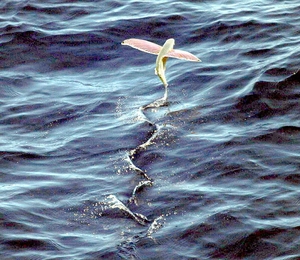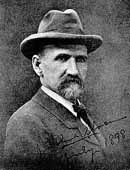They Made Merry the Livelong Day
 Joshua Slocum, born in 1844, left his home in Nova Scotia at
the age of fourteen, to work as a ship’s cabin boy. He eventually
became the first person to sail around the world alone. Slocum’s book about his
travels, Sailing Alone Around the World, was published in 1900. Individuals who have sailed around the world alone since then look up to his example of courage and resourcefulness.
Joshua Slocum, born in 1844, left his home in Nova Scotia at
the age of fourteen, to work as a ship’s cabin boy. He eventually
became the first person to sail around the world alone. Slocum’s book about his
travels, Sailing Alone Around the World, was published in 1900. Individuals who have sailed around the world alone since then look up to his example of courage and resourcefulness.
He was the captain of many vessels throughout his life, was married twice and raised some of his children on board his ships. His life story reads like an adventure novel – he suffered shipwrecks, epidemics, storms, loss of ships and cargo, and was even tried for murder once, but was later acquitted. He had shot and killed a pirate during an attack. His first wife accompanied him at sea for years, giving birth to four children. Unfortunately she died of an illness in Buenos Aires during a voyage. He did remarry, but his second wife didn’t like the sea-going life as well as his first.
Although sailing was his first love – and he did it well – he always desired to be a writer, and began writing about his trips. Sailing Alone Around the World was widely read and made him rich.
 Slocum was most content at sea. His skill in shipbuilding, navigating and sailing afforded
him deep personal fulfillment.
Slocum was most content at sea. His skill in shipbuilding, navigating and sailing afforded
him deep personal fulfillment.
His final voyage began in November of 1909, on The Spray, the same vessel which he used to sail around the world. He never returned, and was believed to be lost at sea.
Here is a passage from his book, describing a moment during the home stretch of his journey around the world. The “She” he refers to is The Spray, the 36’ oyster sloop he rebuilt for the journey.
She was again among her old friends the flying-fish, interesting denizens of the sea. Shooting out of the waves like arrows, and with outstretched wings, they sailed on the wind in graceful curves, then falling till again they touched the crest of the waves to wet their delicate wings and renew the flight. They made merry the livelong day. One of the joyful sights on the ocean of a bright day is the continual flight of these interesting fish.
His affectionate observations are similar to the writings of John Muir or Henry David Thoreau. His book is still available and has never been out of print since it was first published.


